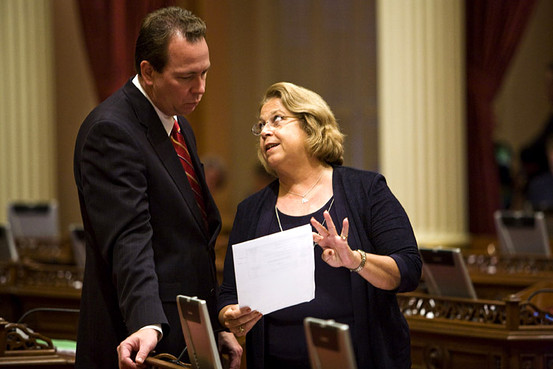Controversy surrounds Propositions 25 and 26

Proposition 25 is one of the most contentious and controversial measures on the ballot in November. If it passes, then a simple majority vote rather than the current two-thirds would be required to pass budget and spending bills. While this might seem a small change, it means the minority party would have less say in the budget.
This is a primary concern for Republicans. Sorry, but that's a bogus argument. The minority party always has less say and simple majority votes have worked just fine for dozens of democracies for hundreds of years. When it gets changed to two-thirds like California and only two other states have now, then a determined minority can block passage of most anything, and the legislature becomes gridlocked. And that's exactly what we have now.
The proposition does have one measure that will bring joy to all those who watch the temper tantrum antics of the willful kindergarteners masquerading as adult legislators in Sacramento. Their salary and expenses will be permanently cut for every day the budget is late. Well, someone needs to rap their knuckles. This would be a good start. I would add to that list all elected state officials and plus all immediate staff of both those officials and legislators. You think that might make Sacramento squeal? I'm guessing this would bring a quick end to budget delays.
Proposition 13 mandated a two-thirds majority for the passage of taxes. Opponents of Proposition 25 say the language in it is sufficiently weasel-worded that it could allow new taxes to be passed by a simple majority. Here's the smoking gun in Prop 25, as they see it, "notwithstanding any other provision of law … bills providing for appropriations related to the budget may be passed a majority." However, another part of Prop 25 says "This measure will not change the two-thirds vote requirement for the Legislature to raise taxes." Ballotpedia says:
"On August 5, 2010, a Superior Court judge ruled that Prop 25 did not maintain the 2/3rds requirement to raise taxes, but the Superior Court's decision was reversed by the California 3rd District Court of Appeals on August 9, 2010, allowing the ballot language to remain intact."
The language does indeed seem murky and contradictory. Should Prop 25 pass and the Democrats then force passage of tax hikes with a simple majority, it is a given that Republicans will sue and the issue will have to be resolved in court. Perhaps Prop 25, if it passes, should retroactively be nicknamed "The Lawyer's Full Employment Act," because it will probably keep battalions of them busy for quite a while.
What would an election be in California without dueling propositions? Prop 25 would roll back the 1933 proposition which changed the budget vote threshold to two-thirds. Also on the ballot in November is Proposition 26, which would mandate a two-thirds vote for any new fees or levies. In an Op-ed, the Sacramento Bee says Prop 26 is a "clear reaction" by business groups to Prop 25, which is heavily supported by unions. They are uneasy about concerns that Prop 25 is a power play by Democrats and unions and that Prop 26 is heavily financed by the alcohol industry and polluters who want to avoid new, higher fees. Thus, they urge a No on both, even as they support the concept of a simple majority vote on budget matters.
"By voting 'no' on both, you can send the warring factions a message: Find common ground in the Legislature for the good of the state, and stop taking your battles to the ballot."
The California proposition system is broken. Its original intent, direct citizen participation in government is long gone and has been replaced by powerful, well-financed interests that sponsor propositions so as to benefit themselves. No other state allows propositions like California has. Either the system is reformed so it becomes genuine citizen participation or it should be abolished. A couple of ways to reform it would be to limit contributions by any individual, PAC, or corporation (either directly or indirectly) to $500 and to ban paid signature collecting.




